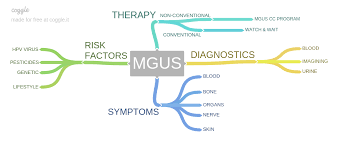-Epigallocatechin-3-gallate (green tea) has potential as a novel therapeutic agent for patients with… multiple myeloma via induction of apoptosis mediated by modification of the redox system.
Green Tea Extract? You’ve been diagnosed with pre-myeloma (SBP, MGUS or SMM). You want to reduce your risk of a frank MM diagnosis but you’re certainly not going to have chemotherapy! What do you do? According to the research below, green tea (EGCG) is a sort of non-toxic chemotherapy. Green tea kills multiple myeloma cells.

Green Tea Extract and EGCG is yet another evidence-based non-conventional therapy that is both cytotoxic to cancer and may enhance the efficacy of conventional chemotherapy regimens. I supplement with green tea extract mainly because one capsule represents many cups of tea.
I supplement with and recommend Life Extension Foundation Mega Green Tea Extract.
I am a MM survivor and MM cancer coach. Personal experience and research has taught me that cancer patients and survivors must draw on both conventional (FDA approved) therapies as well as evidence-based non-conventional therapies such as green tea extract in order to manage their cancer completely.
Have you been diagnosed with SBP, MGUS, SMM or MM? Please scroll down the page, post a question or comment and I will reply to you ASAP.
Thank you,
David Emerson
- MM Survivor
- MM Cancer Coach
- Director PeopleBeatingCancer
Recommended Reading:
“Multiple myeloma is the second most common hematological cancer and is still incurable. Although enhanced understanding of the disease background and the development of novel therapeutics during the last decade resulted in a significant increase of overall survival time, almost all patients relapse and finally succumb to their disease.
Therefore, novel medications are urgently needed. Nature-derived compounds still account for the majority of new therapeutics and especially for the treatment of cancer often serve as lead compounds in drug development.
The present review summarizes the data on plant natural products with in vitro and in vivo activity against multiple myeloma until the end of 2020, focusing on their structure–activity relationship as well as the investigated pathways and involved molecules…”
“Results: (−)-Epigallocatechin-3-gallate rapidly induced apoptotic cell death in various malignant B-cell lines in a dose- and time-dependent manner. (−)-Epigallocatechin-3-gallate-induced apoptosis was in association with the loss of mitochondrial transmembrane potentials (Δψm); the release of cytochrome c, Smac/DIABLO, and AIF from mitochondria into the cytosol; and the activation of caspase-3 and caspase-9.
Elevation of intracellular reactive oxygen species (ROS) production was also shown during (−)-epigallocatechin-3-gallate-induced apoptosis of HS-sultan and RPMI8226 cells as well as fresh myeloma cells. Antioxidant, catalase, and Mn superoxide dismutase significantly reduced ROS production and (−)-epigallocatechin-3-gallate-induced apoptosis, suggesting that ROS plays a key role in (−)-epigallocatechin-3-gallate-induced apoptosis in B cells.
Furthermore, a combination with arsenic trioxide (As2O3) and (−)-epigallocatechin-3-gallate significantly enhanced induction of apoptosis compared with As2O3 alone via decreased intracellular reduced glutathione levels and increased production of ROS.
Conclusions: (−)-Epigallocatechin-3-gallate has potential as a novel therapeutic agent for patients with B-cell malignancies including multiple myeloma via induction of apoptosis mediated by modification of the redox system.
In addition, (−)-epigallocatechin-3-gallate enhanced As2O3-induced apoptosis in human multiple myeloma cells.
“Metastasis is the most deadly aspect of cancer and results from several interconnected processes including cell proliferation, angiogenesis, cell adhesion, migration, and invasion into the surrounding tissue. The appearance of metastases in organs distant from the primary tumor is the most destructive feature of cancer. Metastasis remains the principal cause of the deaths of cancer patients despite decades of research aimed at restricting tumor growth. Therefore, inhibition of metastasis is one of the most important issues in cancer research…”
- Green tea (GT) and metastasis of skin cancer
- GT and metastasis of prostate cancer
- GT and metastasis of breast cancer
- GT and metastasis of lung cancer
- GT and metastasis of liver cancer
- GT and metastasis of colon cancer
- GT and metastasis of pancreatic cancer
- GT and metastasis of miscellaneous cancers
Metastasis is responsible for most deaths due to cancer and therefore, therapeutic strategies to prevent development of metastases have potential to impact on cancer mortality…”
APPIP ERROR: amazonproducts[
AccessDeniedAwsUsers|The Access Key Id AKIAJAJ37JVNL7OUU4CA is not enabled for accessing this version of Product Advertising API. Please migrate your credentials as referred here https://webservices.amazon.com/paapi5/documentation/migrating-your-product-advertising-api-account-from-your-aws-account.html.
]




